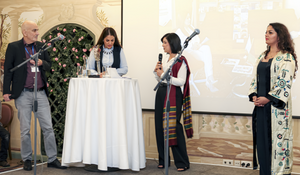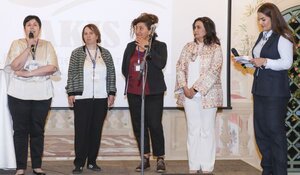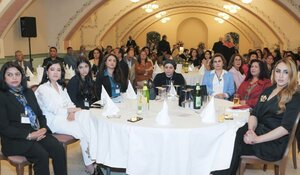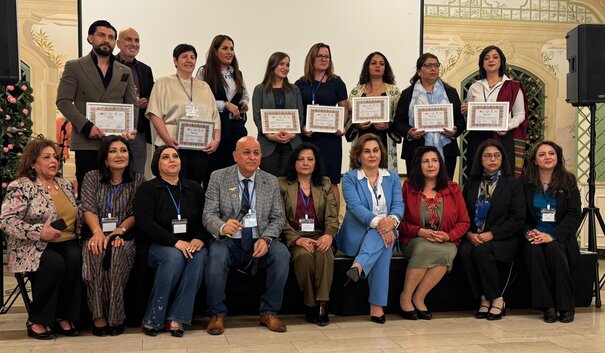(18 June 2025) “In a time when the world is talking about Artificial Intelligence and traveling to Mars, Afghan women are still fighting for the basic right to education. We should be mad, we should be angry, we should shout, we should act,” declared Afghan women’s rights activist Tahmina Salik at a reception at the Vienna City Hall on May 23. The reception was followed by a one-day conference titled "Against Gender Apartheid: Promoting Afghan Women and Girls through Education and Work," organized by the Afghan Cultural Association - AKIS in cooperation with the VIDC, the Vienna Chamber of Labor, and the Women’s Department of the Austrian Trade Union Federation. More than 100 people comprising Afghan women rights activists, representatives of various Afghan diaspora organizations in Europe, former Afghan government officials, Members of the Vienna City Council, diplomats, members of migrants’ counselling centers and members of international organizations participated in the event.

“Legitimizing the Taliban does not civilize their brutality.”
Since the withdrawal of U.S.-led NATO forces and the return of the Taliban to power in August 2021, the Taliban regime has issued more than 100 edicts institutionalizing the systematic persecution of Afghan women and girls solely based on their gender. These decrees severely restrict their mobility, public presence, as well as their access to education, healthcare, and employment. In July 2024, these restrictions were codified into the “Morality Law for the Promotion of Virtue and Prevention of Vice,” which enforces strict dress codes and bans women from singing and participating in public life.
“Just by entering this room — if I were in Afghanistan — I would have broken several laws: starting from my dress to the fact that I have a voice, that I’m speaking to both men and women, and most importantly, for speaking about women’s rights”, Salik emphasized. “What would my punishment be? Probably prison. I don't even want to imagine what else could happen.”
For nearly four years, the Taliban have shown no sign of retreating from its extremist ideology. “They are implementing a system of radical indoctrination, turning schools into hubs of extremism,” asserted human rights defender Shagofah Ghafori. She pointed out that the threat of radicalization will not remain confined to Afghanistan and criticized the international community for “flirting” with the idea of recognizing the Taliban, “as if legitimizing them might civilize their brutality.”
Call for Political and Legal Actions against the Taliban
At the reception, the Ambassador of Afghanistan to Austria, Manizha Bakhtari, stated that any system that deliberately excludes women and girls from public life constitutes gender apartheid. There must be legal remedies that recognize gender-based persecution as such. The recognition and codification of gender apartheid as a crime against humanity under international law would help to hold the Taliban accountable for their actions, and “prevent governments from normalizing relationships with the Taliban”. Like Ghafori, Bakhtari called on Vienna’s politicians to stand firmly against the normalization of relations with the Taliban: “The international community has a legal and moral duty to act accordingly.”

In her speech, Magda Seewald (VIDC Global Dialogue) expressed strong support for the Afghan diaspora’s campaigns against gender apartheid in Afghanistan. The common aim of these campaigns is to provide victims and survivors of gender apartheid with a legal framework that identifies and condemns the Taliban as perpetrators under international law. The recently published VIDC Policy Brief Gender Apartheid in Afghanistan supports the campaigns and offers key recommendations for policymakers and stakeholders in Austria and across the European Union. VIDC aims to use it both, as an advocacy tool to inform decision-makers and to support concrete actions in favor of Afghan women and diaspora-led initiatives.
Call for Global Solidarity with Afghan Women
Ghousuddin Mir, chair of AKIS and main organizer of the event stated that despite living in safety in Austria, his heart and thoughts remain with the Afghan women. He criticized the international community for turning a blind eye and prioritizing political interests over human rights: “I don't understand how the world is making deals and moving toward recognizing the Taliban — it is painful to watch.”
Palwasha Kakar, former deputy minister for Women’s Affairs in Afghanistan, addressed in her speech the urgent need for the protection of basic rights — most notably education for Afghan women and girls. She recalled her grandmother who established a school for girls a century ago in her home village. But today, Afghan women are forced to fight for their fundamental freedoms. Conveying the message of hope and resilience, Kakar called upon the international community to demonstrate genuine solidarity with the Afghan women.

Andrea Mautz, on behalf of Vienna’s mayor Michael Ludwig, expressed her solidarity with the women of Afghanistan and reaffirmed the City of Vienna’s commitment to the principle “women’s rights are human rights”, and must always be defended. She asserted that a just and equitable society is only possible when there is gender equality: “We must stand together in solidarity – internationally, politically, and across civil society. Only together we can bring about change.”
Representing the Vienna Chamber of Labor, Asiye Sel reminded the audience that the oppression of women in Afghanistan is not merely a national crisis but a global concern, emphasizing the need for collective action and global solidarity. Similarly, Karin Zimmermann from the Austrian Trade Union Federation pointed out the importance of global solidarity and agency: “genuine trade union work means listening, not speaking about people but with them, to understand their needs and find solution together.”
Call for Empowering Afghan Women and Sensitizing Afghan Men in Austria
While much focus was on the situation of women inside Afghanistan, speakers also drew attention to the situation of Afghan women in Austria. They highlighted Afghan women face their own set of challenges – navigating discrimination, labor market and inclusion barriers. In diaspora, they continue resisting the Taliban through advocacy, education, and digital campaigns.
Maryam Singh, head of an Austrian NGO for labour market integration (Beratungszentrum für Migranten und Migrantinnen), highlighted the diversity and complexity within the Afghan community in Austria. She explained that Afghan women arrived at different times with various backgrounds — many well-educated women who came through family reunification after the Taliban takeover, bringing valuable skills that often are unrecognized in the local job market. She stressed the importance of understanding the complex realities these women face and emphasized that empowering Afghan women requires addressing patriarchal structures deeply rooted in society. “We must also work with men,” Singh said, “to achieve meaningful and lasting change.”

